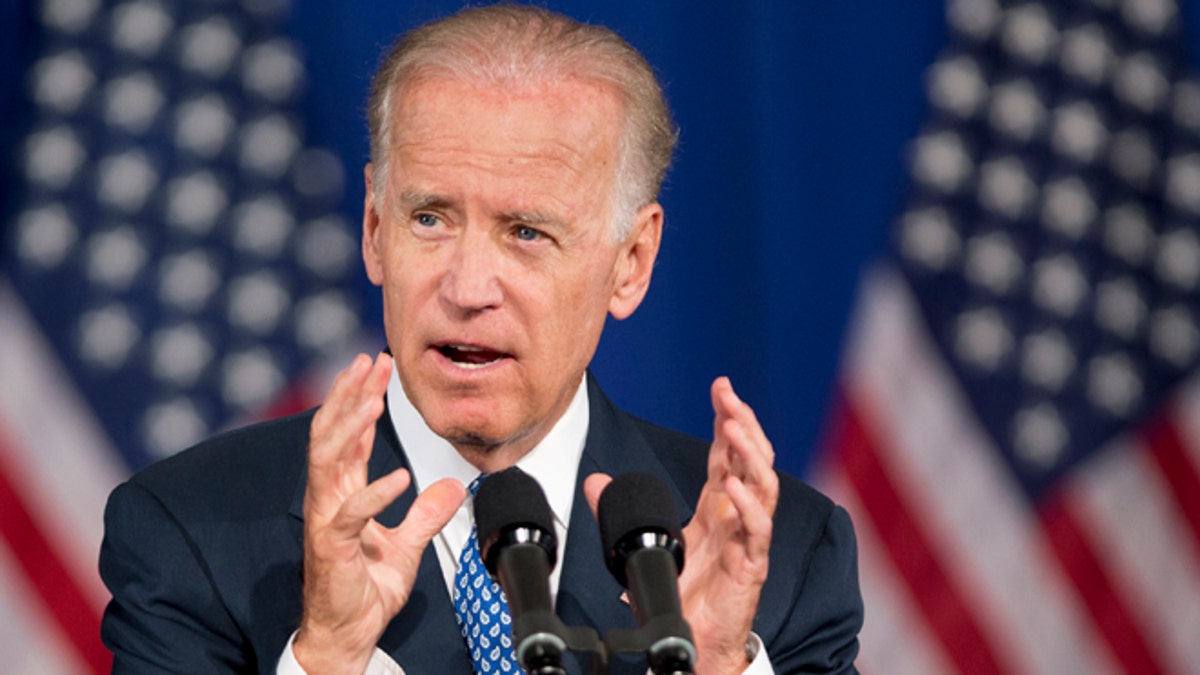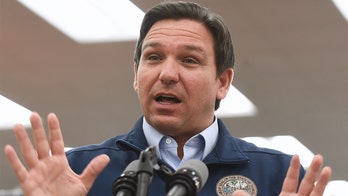
(AP)
Since when has a sitting vice president been relegated to the second string of candidates in the race for the White House?
Yet that's what seems to be happening as Hillary Clinton soaks up all the 2016 speculation, leaving Vice President Biden to quietly lay the groundwork for his own possible bid, should he choose to make one. As if to offer a gentle reminder that he is still very much interested in becoming the 2016 Democratic nominee, the vice president has scheduled a major political event next month in Iowa -- where presidential hopefuls must clear the first hurdle, the Iowa caucuses.
Modern history shows every sitting, able-bodied vice president vying for an open seat entered the presidential race as a leading candidate, and went on to become his party’s presidential nominee. From Richard Nixon in 1960 all the way to Al Gore in 2000, sitting vice presidents have enjoyed an evident advantage in seeking the nomination -- though in that period, only George H.W. Bush went on to win the presidency itself in that race. Nixon won on his second attempt, in 1968.
Biden is making all the right moves, in terms of where he travels. He spoke earlier this year in South Carolina, home of the first-in-the-South primary. He plans to raise money in Maine for the governor of New Hampshire, which holds the first primary. And he'll go to Iowa to headline a steak fry fundraiser on Sept. 15 for Democratic Sen. Tom Harkin.
Daily politics news delivered to your inbox: sign up for our newsletter
But Biden’s quest to keep the VP streak alive, should he run, faces an unusual challenge in competing against the widely popular and politically powerful Clinton.
Vice presidents become the nominee largely through a combination of accomplishment and the advantage of being in the national spotlight for at least four years.
Biden approaches Election Day 2016 as the tireless champion of President Obama’s successful 2012 re-election effort. But his on-camera efforts during the 2008 and 2012 campaigns and as Obama’s second-in-command have exposed both strengths and weaknesses.
His working-class image helped lock down the minority and organized-labor vote for Obama. But gaffes and his post-election failure to lead the effort to pass gun-control legislation will also be part of his resume should he make a third presidential run.
Clinton lost the 2008 Democratic nomination to Obama after front-running for much of the election cycle, then eventually received the post of secretary of State.
Joe Trippi, a Democratic strategist and Fox New contributor, said Clinton was wise to eschew the vice presidential offer -- “assuming it was offered to her” -- in hopes of getting a Cabinet position.
He argues such posts are high-profile jobs where politicians can create a legacy slightly beyond the “long shadow of the president,” and that vice presidents are essentially stuck in the job until the end, making it hard for them to campaign for themselves in the closing months.
“With the Cabinet post, they can leave when they want,” Trippi said. “They can get out of office before the run.”
David Heller, a Democratic campaign strategist, thinks Clinton would have been the prohibitive favorite regardless of whether she was vice president or secretary of State.
Heller, president of the media consulting firm Main Street Communications, argues that Clinton as secretary of State was able to sharpen her foreign policy expertise and develop relationships, which will make her a better candidate.
However, he argues, taking the vice president job would have made Biden less viable today.
“Either way would have worked out great,” Heller said. “She’s Hillary Clinton.”
The list of vice presidents who became presidential nominees after Nixon is rounded out by Democrat Hubert Humphrey in 1968, Republican George H.W. Bush in 1988 and Democrat Al Gore in 2000. Gore trailed New Jersey Sen. Bill Bradley in early 1999 but eventually won the Iowa caucuses and the first-in-the-nation New Hampshire primary.
So far this year, Clinton is really the only Democrat to attract early Republican attention.
The Republican National Committee recently entered the debate when it blasted NBC and CNN for plans to air a Clinton documentary and miniseries, respectively.
Republicans and others who don’t want Clinton to become president have started at least three political action committees to knock down the former first lady’s early public support.
Clinton's lead very, very early in the cycle is daunting. She leads Biden and other potential Democratic candidates by 51 percentage points, according to an averaging of polls by the website Real Clear Politics.




